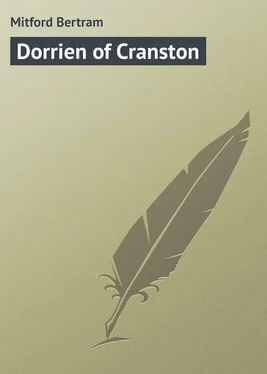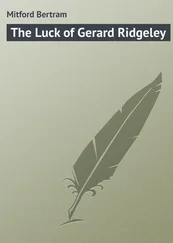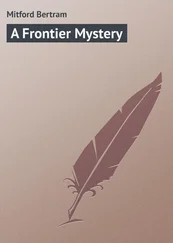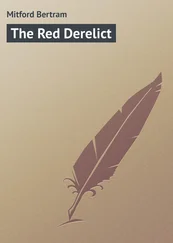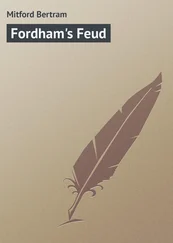Bertram Mitford - Dorrien of Cranston
Здесь есть возможность читать онлайн «Bertram Mitford - Dorrien of Cranston» — ознакомительный отрывок электронной книги совершенно бесплатно, а после прочтения отрывка купить полную версию. В некоторых случаях можно слушать аудио, скачать через торрент в формате fb2 и присутствует краткое содержание. Жанр: foreign_prose, на английском языке. Описание произведения, (предисловие) а так же отзывы посетителей доступны на портале библиотеки ЛибКат.
- Название:Dorrien of Cranston
- Автор:
- Жанр:
- Год:неизвестен
- ISBN:нет данных
- Рейтинг книги:4 / 5. Голосов: 1
-
Избранное:Добавить в избранное
- Отзывы:
-
Ваша оценка:
- 80
- 1
- 2
- 3
- 4
- 5
Dorrien of Cranston: краткое содержание, описание и аннотация
Предлагаем к чтению аннотацию, описание, краткое содержание или предисловие (зависит от того, что написал сам автор книги «Dorrien of Cranston»). Если вы не нашли необходимую информацию о книге — напишите в комментариях, мы постараемся отыскать её.
Dorrien of Cranston — читать онлайн ознакомительный отрывок
Ниже представлен текст книги, разбитый по страницам. Система сохранения места последней прочитанной страницы, позволяет с удобством читать онлайн бесплатно книгу «Dorrien of Cranston», без необходимости каждый раз заново искать на чём Вы остановились. Поставьте закладку, и сможете в любой момент перейти на страницу, на которой закончили чтение.
Интервал:
Закладка:
“But he was acquitted the first time, and the second there was a doubt,” expostulated the clerical justice – a kindly-hearted man who, although his commission of the peace was congenial to a harmless vanity, disliked punishing his fellow men. “I think we might give him another chance.” So two of the trio being in favour of mercy, stern justice was outvoted.
“Now look here, Devine,” said Colonel Neville, “even if we believed every word of your story – which you can’t expect us to do, considering that you have already been up twice before us on similar charges – it would be no excuse, and you know that as well as we do. If you can’t get work here – and it’s your own fault if you can’t, because you quarrel with everyone who employs you – the best thing to do is to go to some other place, where you can. Anyhow, you’ve broken the law this time and we can’t overlook it, but we are going to give you another chance, though at first we had fully intended sending you to gaol. You will be fined ten shillings, that is five shillings for each act of poaching, and costs; in default a month’s hard labour.”
The prisoner’s countenance, which had lightened considerably at the words “another chance,” now fell again.
“Please, Kurnel,” he began, “I haven’t got five halfpence, let alone ten – ”
“Well, we can’t help that,” testily retorted Colonel Neville, who was feeling the effects of the close, stuffy room. “We have dealt with you very leniently as it is. Next case, Mr Inspector.”
So Stephen Devine was removed, and a yokel took his place, charged with cruelty to a horse, then came a couple of disputed paternity cases, the particulars of which, though highly instructive to the student of the manners and customs of the lower orders in rural districts, are in no wise material to this narrative; and so the business of the day proceeded, until at length the three magnates who had sacrificed themselves to the cause of justice in Wandsborough were emancipated and free to return to their respective homes.
“Upon my word, Neville, you do let those rascals down uncommonly easy,” observed Mr Pagnell to his brother magistrate, as the two rode homewards. “Poaching is the very thing we ought to stamp out ruthlessly in these days. Why, that ruffian Devine has simply got off scot free.”
“Poor devil,” answered the kind-hearted Colonel, who under the influence of fresh air and the prospects of no more Sessions for a month, had quite recovered his good humour. “Poor devil, I believe he’s been trying to keep square since his daughter came back. But he’ll have to do his month, for he’ll never be able to pay his fine.”
“Won’t he! You’ll see that he will, and we shall have him up before us again next Bench day. The fellow’s an irreclaimable scamp. Well, our ways part here. Good-bye.”
About half way between Cranston and Wandsborough, but in the latter parish, and in an angle formed by the footpath across the fields with a deep lane, stands a cottage – one of those picturesque, snug-looking nests which you shall see in no other country in the world – thatched, diamond-paned, and a bit of half garden, half orchard in front, and a background of elder trees and high hawthorn bushes. But, for all its external picturesqueness, an exploration of the interior of this abode would reveal a very poverty-stricken state of things. There is a neglected look about everything, and the rooms, bare of all but a few worthless sticks of furniture – too worthless even for the bailiffs or the pawnshop, seem to point eloquently to the sort of person their occupier would be – shiftless, hang-dog, ne’er-do-well, and not unfrequently drunken. It is the abode of Stephen Devine, alias Gipsy Steve, whose acquaintance we have just made.
At the moment when that worthy learns his fate in the Wandsborough Sessions room, there stands in the doorway of his abode a girl. Her dress, appearance, and the rough dusting-cloth in her hand seem to show that she has paused in the commonplace but laudable occupation of tidying up, and is there at the door for a breath of fresh air and a look round; and her coarseness of garb and surroundings notwithstanding, the girl would assuredly attract from the passer-by no mere casual glance, for she is of striking and uncommon beauty. Her almost swarthy complexion ought by all rules to go with jetty locks and dark flashing eyes, but it does not. The masses of hair crowning her well-carried head are light brown, just falling short of golden, and harmonise wonderfully with the smooth tawny skin, and her eyes are large, limpid and blue. The mouth, too, is not the least beautiful feature – full, red and sensuous. She is a tall girl, of splendid build and proportions, and the light, closely-fitting gown displays a figure which would have commanded a fabulous price in the slave-markets of old, and the easy, restful, leaning attitude as she stands in the doorway defines the swelling lines of her finely moulded form. A magnificent animal truly, and withal a dangerous one. Such is Lizzie Devine, the poacher’s daughter.
The passer-by referred to above would assuredly pronounce her to be no ordinary cottage girl, and he would be right. She had not inhabited the humble abode where we find her more than a fortnight; for she had only just returned from what the neighbours vaguely termed “foreign parts,” which vagueness neither Lizzie nor her father were disposed to reduce to definition. Here she was, anyhow, beneath “Gipsy Steve’s” poverty-stricken and highly disreputable roof, and the neighbours looked at her askance, as in duty bound. For this did Lizzie care not one rush. Her movements and pursuits were as mysterious as the antecedents of her father. The gossips hate mystery – therefore, said the gossips, she must have been after no good. Some thought she had been “a play-actress,” some thought even worse. Some thought one thing, some another – but Lizzie didn’t care what they thought. Neither she nor Steve mixed with their neighbours – she from choice, he from necessity; for he was disliked and feared as a quarrelsome and dangerous man. One thing was certain, whatever occupation Lizzie had been pursuing, she had returned home with empty pockets, and this ought to have told in her favour, for the ways of evil are lucrative.
She stands in the doorway looking out over the sunlit fields, and her thoughts are chaotic. At first she wearily wonders whether her father will be discharged with a reprimand, and if not what she can pawn in order to pay his fine. Then her reflections fly off at a tangent. Away in the distance, the chimneys of Cranston Hall appear above the trees, and on these the girl’s clear blue eyes are fixed, while she indulges in a day-dream. Yet she is a hard, practical young party enough, for she is twenty-four, and has seen a very considerable slice of this habitable globe.
Suddenly her frame becomes rigid, and the blood surges to her face, then falls back, leaving it ashy pale. What has she spied to bring about this convulsion? Only a man, of course.
He is advancing along the field path with an easy swinging stride. As she gazes, a large red and white dog comes tearing over the further stile and scampers joyously past his master. The girl stands in a state of strange irresolution, her heart beating like a hammer. He has not seen her – one step inside and he will have passed by. But her chance of retreat is gone. While she is doubting, the man passes the gate, and as he does so looks carelessly up.
Roland Dorrien is not wont to exhibit wild surprise over anything, but the start which he gives as his eyes meet those of the girl before him, proves that his astonishment is genuine.
“Lizzie!”
“You don’t seem overmuch glad to see me anyhow,” says the girl in a hard tone, her self-possession now quite in hand again.
Читать дальшеИнтервал:
Закладка:
Похожие книги на «Dorrien of Cranston»
Представляем Вашему вниманию похожие книги на «Dorrien of Cranston» списком для выбора. Мы отобрали схожую по названию и смыслу литературу в надежде предоставить читателям больше вариантов отыскать новые, интересные, ещё непрочитанные произведения.
Обсуждение, отзывы о книге «Dorrien of Cranston» и просто собственные мнения читателей. Оставьте ваши комментарии, напишите, что Вы думаете о произведении, его смысле или главных героях. Укажите что конкретно понравилось, а что нет, и почему Вы так считаете.
